Who Owns Xiaomi: The Largest Shareholders Overview
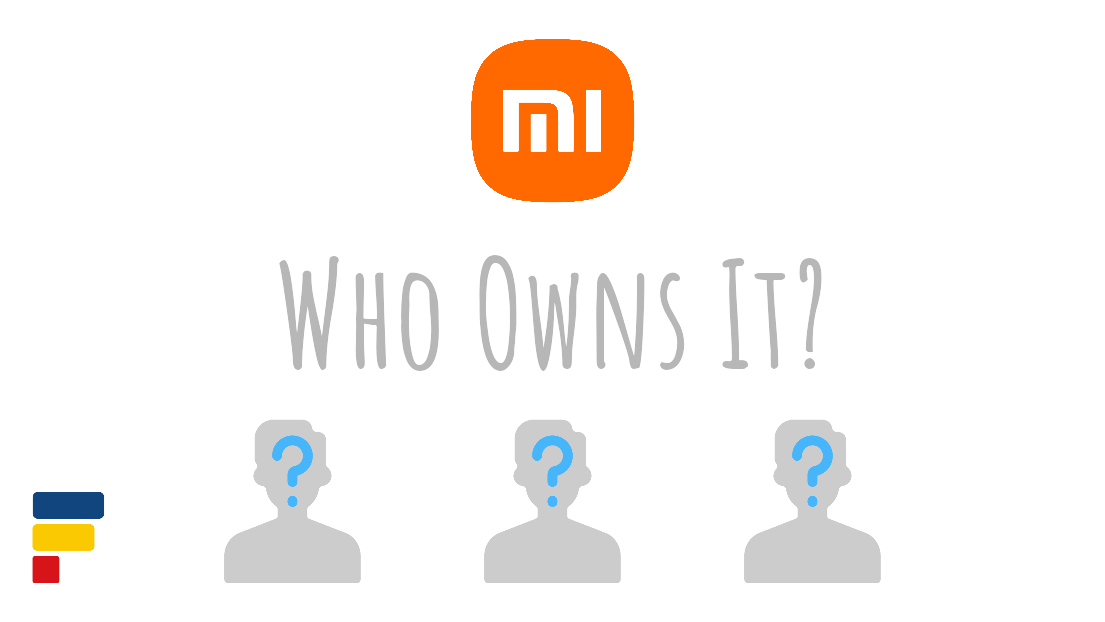
Xiaomi Corporation (HK:1810) is a Chinese-based consumer electronics manufacturer that makes money predominantly by selling smartphones but also TVs, tablets, and IoT products. Xiaomi is 2nd largest smartphone manufacturer after Samsung. Let’s now look at who owns Xiaomi and controls it.
The largest shareholder of Xiaomi Corporation is its founder and CEO, Lei Jun, who owns a 24% ownership share, followed by co-founder Lin Bin (9%), Liu Qin (1%), and co-founder Liu De (1%). However, thanks to “super-voting” shares, Lei Jun holds 65% of all votes and has full control over the company.
|
|
|||
| Shareholder | Ownership | Voting Power | |
|---|---|---|---|
| Lei Jun | 24.2% | 65.4% | |
| Lin Bin | 9.4% | 9.7% | |
| Liu Qin | 0.7% | 0.3% | |
| Liu De | 0.6% | 0.2% | |
| Other | 65.1% | 24.4% | |
| Listed are shareholders holding >5% of any share class or notable in other ways | |||
 Source: Annual Report Source: Annual Report |
|||
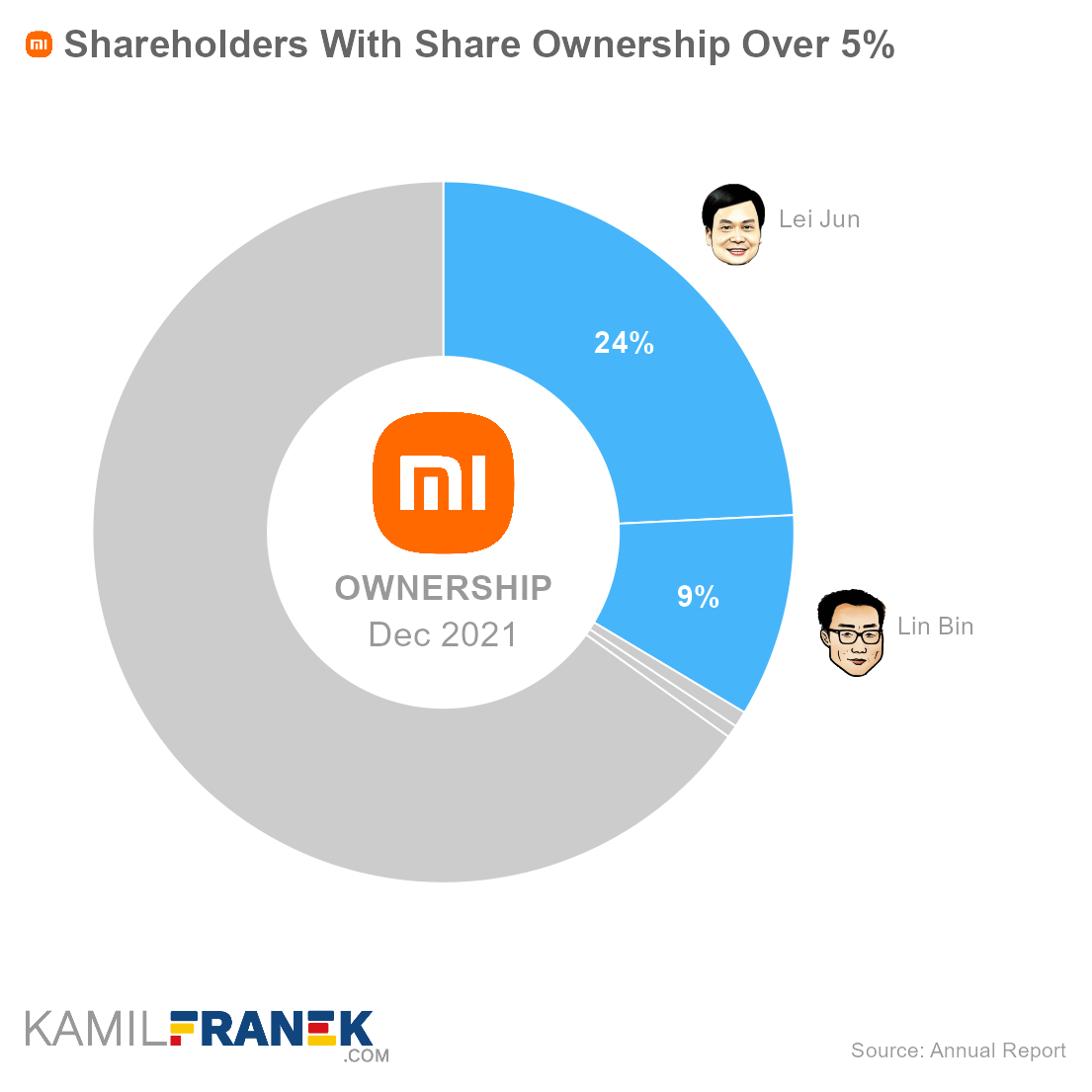
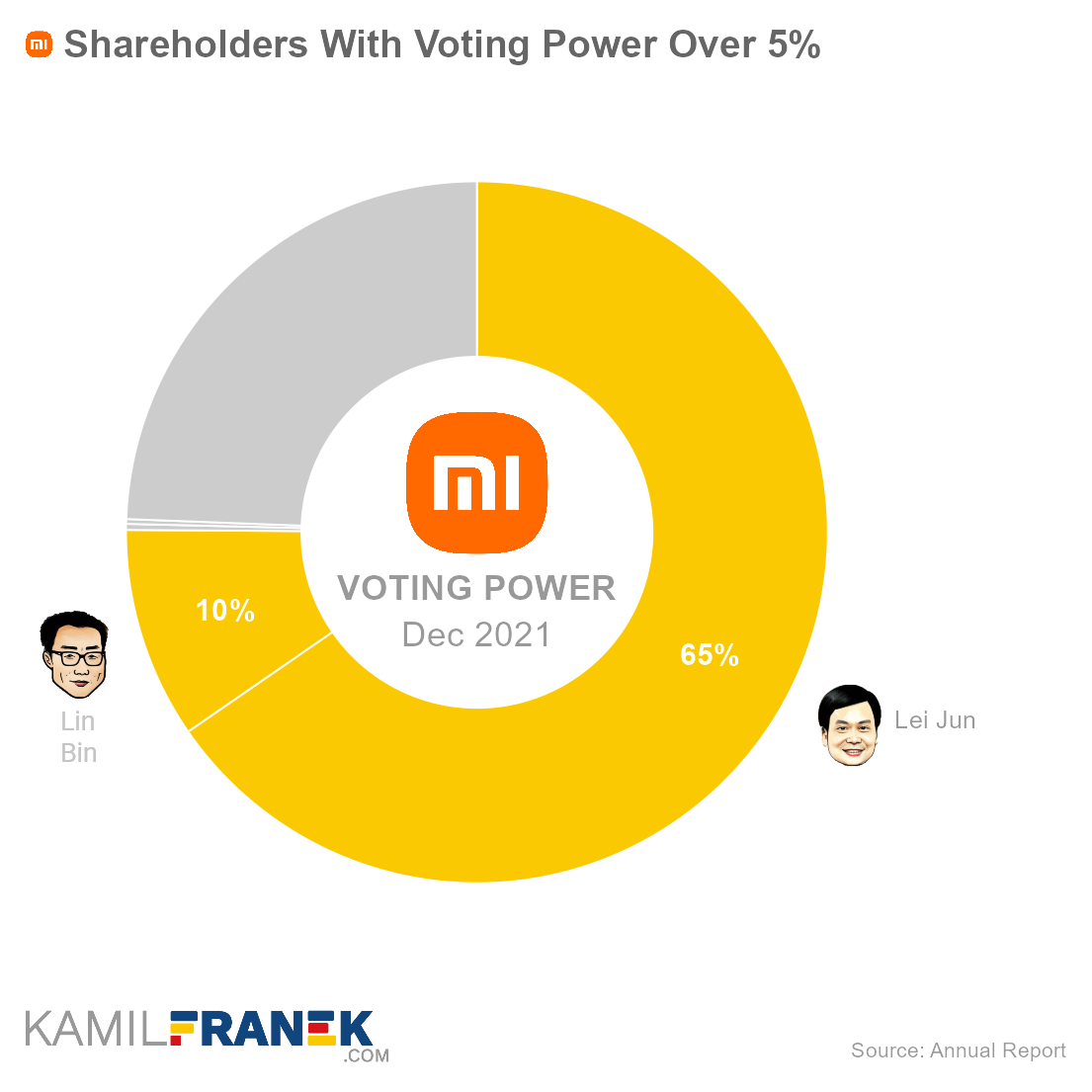
The top shareholder of Xiaomi is its founder and CEO, Lei Jun. He is not only the largest shareholder with 24% ownership but thanks to super-voting shares, he also holds the majority of votes and fully controls the company.
A large Xiaomi shareholder is also a co-founder and Vice Chairman of the Xiaomi Group, Lin Bin, with 9% ownership.
Xiaomi was founded in 2010 by Lei Jun and other co-founders: Hong Feng, Li Wanqiang, Lin Bin, Liu De, Wang Chuan, Wong Kong Kat, and Zhou Guangping. Xiaomi’s initial public offering was in 2018 when company shares were listed in Hong Kong.
Right after the Hong Kong listing, Lei Jun held 29,4% of the share capital and approximately 54,74% of voting rights.
In this article, I will dive more into who Xiaomi’s largest shareholders are, how many shares and votes they have, and how much their stake is worth. I will also explore some other topics related to its ownership structure.
If you are interested, you can also explore who owns other companies like Alphabet(Google), Apple, PayPal, or Nike.
🕹️ Who Owns Xiaomi (HK:1810) and Who Has Control?
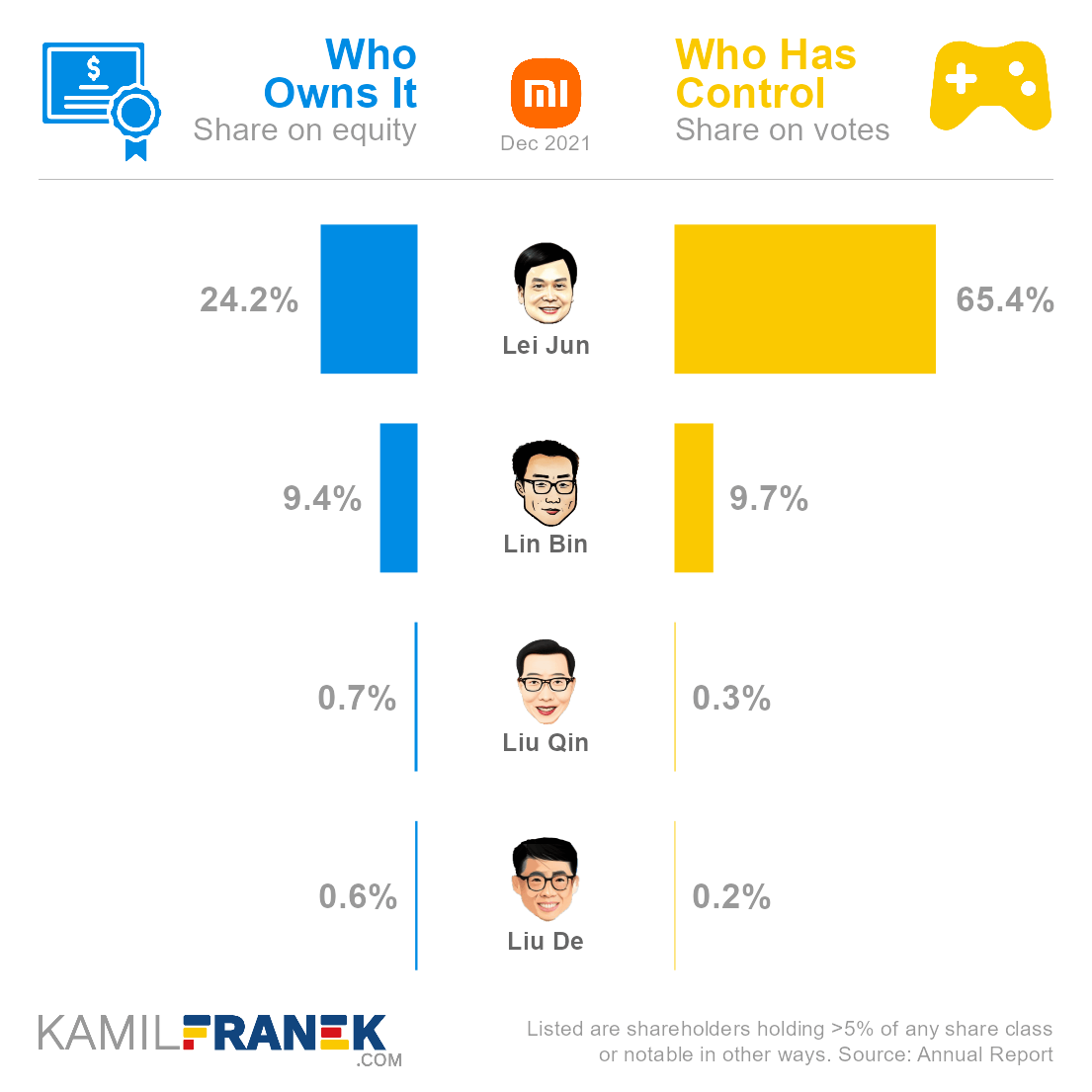
Lei Jun, Xiaomi founder, Chairman, and CEO, owns 24% of Xiaomi. However, he holds 65% of the voting power. This is possible thanks to the super-voting shares he and a couple of other shareholders hold. Such a high voting power gives him full control over the company and makes the voting power of other shareholders irrelevant.
Xiaomi Corporation has two classes of outstanding shares:
- Class A common shares: These are not publicly traded but are convertible into Class B publicly traded shares. They are held mainly by Lei Jun and also by other insiders. Class A shares have the same economic right as Class B shares but have ten(10) votes per share
- Class B common shares: These are ordinary shares traded under the ticker “1810” on Hong Kong Exchange. In the US, Xiaomi shares are traded on the OTC market under the XIACF ticker.
As is common with super-voting shares issued to founders and early investors, there are some limitations on Class A shares’ super-voting powers.
One of the limitations is that Class A sharer will automatically convert to Class B shares in the following situations:
- If the holder of the A class shares dies, is incapacitated, or ceases to be a director
- If Class A shares are transferred to somebody else
Any rule change governing Class A shares requires 75% approval by Class A shareholders.
The company is also not allowed to issue or repurchase shares of any class if it would result in an increase in super-voting shares (Class A) proportion or B Class voting power would go below 10%.
🗳️ Breakdown of Xiaomi’s Outstanding Shares and Votes by Top Shareholders
Xiaomi Corporation had a total of 24,997 million outstanding shares as of December 2021. The following table shows how many shares each Xiaomi’s large shareholder holds.
|
|
|||||
| In millions of shares as of December 2021 | |||||
| Shareholder | Class A | Class B | Total | % Share | |
|---|---|---|---|---|---|
| Lei Jun | 4,173 | 1,882 | 6,054 | 24.2% | |
| Lin Bin | 460 | 1,879 | 2,340 | 9.4% | |
| Liu Qin | - | 184 | 184 | 0.7% | |
| Liu De | - | 146 | 146 | 0.6% | |
| Other | 0 | 16,272 | 16,272 | 65.1% | |
| Total (# millions) | 4,633 | 20,364 | 24,997 | 100.0% | |
| Listed are shareholders holding >5% of any share class or notable in other ways | |||||
 Source: Annual Report Source: Annual Report |
|||||
There were 66,695 million votes distributed among shareholders of Xiaomi Corporation. The table below shows the total number of votes for each large shareholder.
|
|
|||||
| In millions of votes as of December 2021 | |||||
| Shareholder | Class A | Class B | Total | % Share | |
|---|---|---|---|---|---|
| Lei Jun | 41,726 | 1,882 | 43,607 | 65.4% | |
| Lin Bin | 4,605 | 1,879 | 6,484 | 9.7% | |
| Liu Qin | - | 184 | 184 | 0.3% | |
| Liu De | - | 146 | 146 | 0.2% | |
| Other | 0 | 16,272 | 16,273 | 24.4% | |
| Total (# millions) | 46,331 | 20,364 | 66,695 | 100.0% | |
| Listed are shareholders holding >5% of any share class or notable in other ways | |||||
 Source: Annual Report Source: Annual Report |
|||||
Owning class B shares with ten(10) votes per share gives some shareholders larger voting power compared to shareholders who own regular shares that are publicly traded.
💵 Breakdown of Xiaomi’s Market Value by Shareholder
The following table summarizes how much is each shareholder’s stake in Xiaomi Corporation worth.
However, keep in mind that a stake in Xiaomi could be just one part of their portfolio, and their total worth could be bigger, thanks to other investments. It could also be lower if they have debts.
|
|
|||||
| Market value in billions $ as of December 2021 | |||||
| Shareholder | Class A | Class B | Total | % Share | |
|---|---|---|---|---|---|
| Lei Jun | $10 | $5 | $15 | 24.2% | |
| Lin Bin | $1 | $5 | $6 | 9.4% | |
| Liu Qin | - | $0 | $0 | 0.7% | |
| Liu De | - | $0 | $0 | 0.6% | |
| Other | $0 | $39 | $39 | 65.1% | |
| Total ($ billions) | $11 | $49 | $61 | 100.0% | |
| Listed are shareholders holding >5% of any share class or notable in other ways | |||||
 Source: Annual Report Source: Annual Report |
|||||
Let’s now look at each Xiaomi shareholder individually.
📒 Who Are the Largest Shareholders of Xiaomi Corporation
Let’s now go through the list of the largest shareholders of Xiaomi Corporation one by one and look at who they are, how many shares they own, what is their voting power, and how much is their stake in Xiaomi worth.
#1 Lei Jun
Lei Jun holds 24% of Xiaomi’s shares which makes him its largest shareholder. However, thanks to super-voting shares that Lei Jun owns, its share of total votes is 65%.
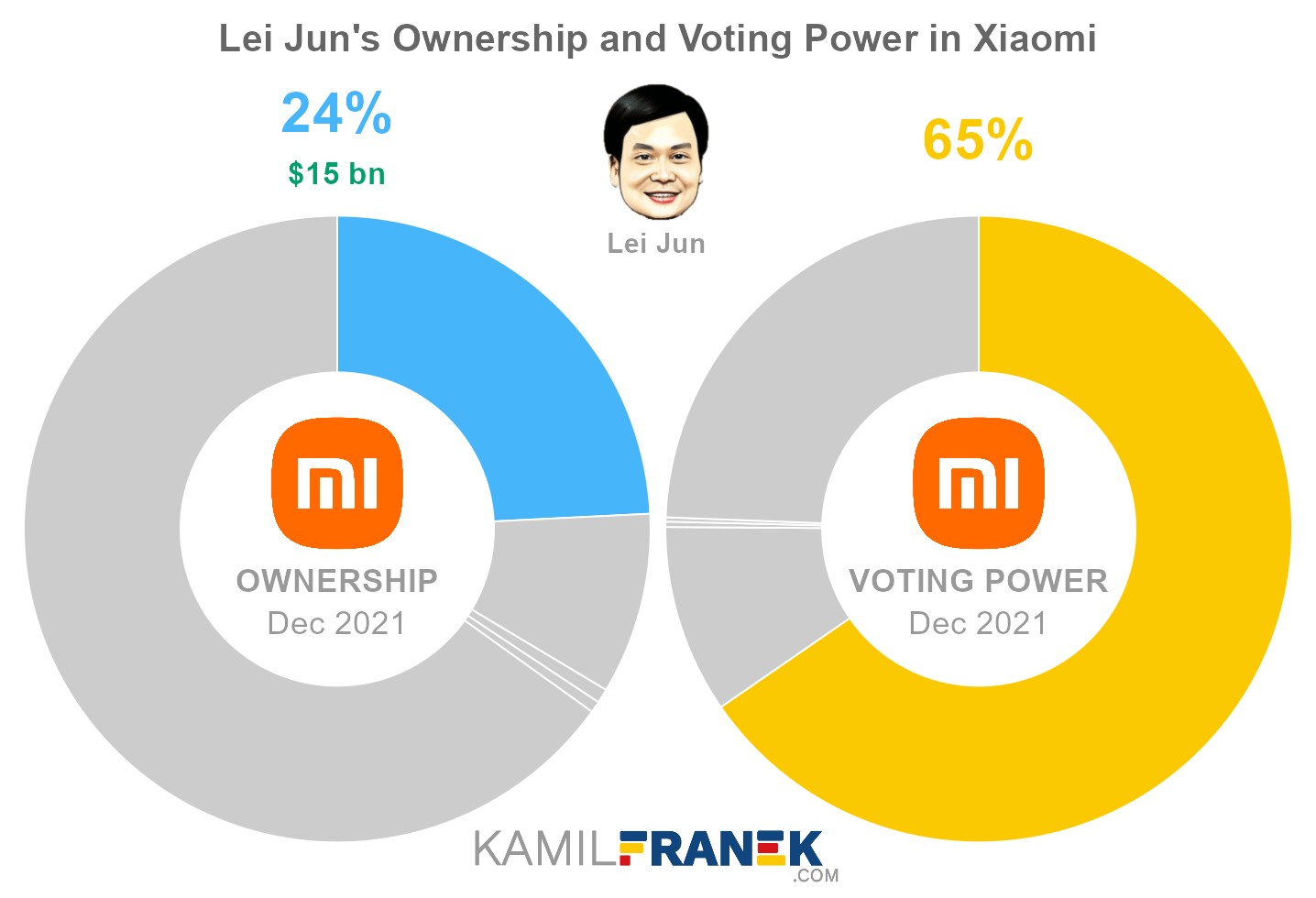
Lei Jun owns 6,054 million Xiaomi shares, representing 43,607 million shareholder votes. The market value of Lei Jun’s stake in Xiaomi was $15 billion as of December 2021.
Lei Jun is the founder, CEO, chairman, and controlling shareholder of the Xiaomi Group. Xiaomi is not his first startup, however. He founded the online retailer joyo.com in 2000, which Amazon acquired in 2004.
#2 Lin Bin
Lin Bin holds 9% of Xiaomi’s shares which makes him its second-largest shareholder. However, thanks to super-voting shares that Lin Bin owns, his share of total votes is 10%.
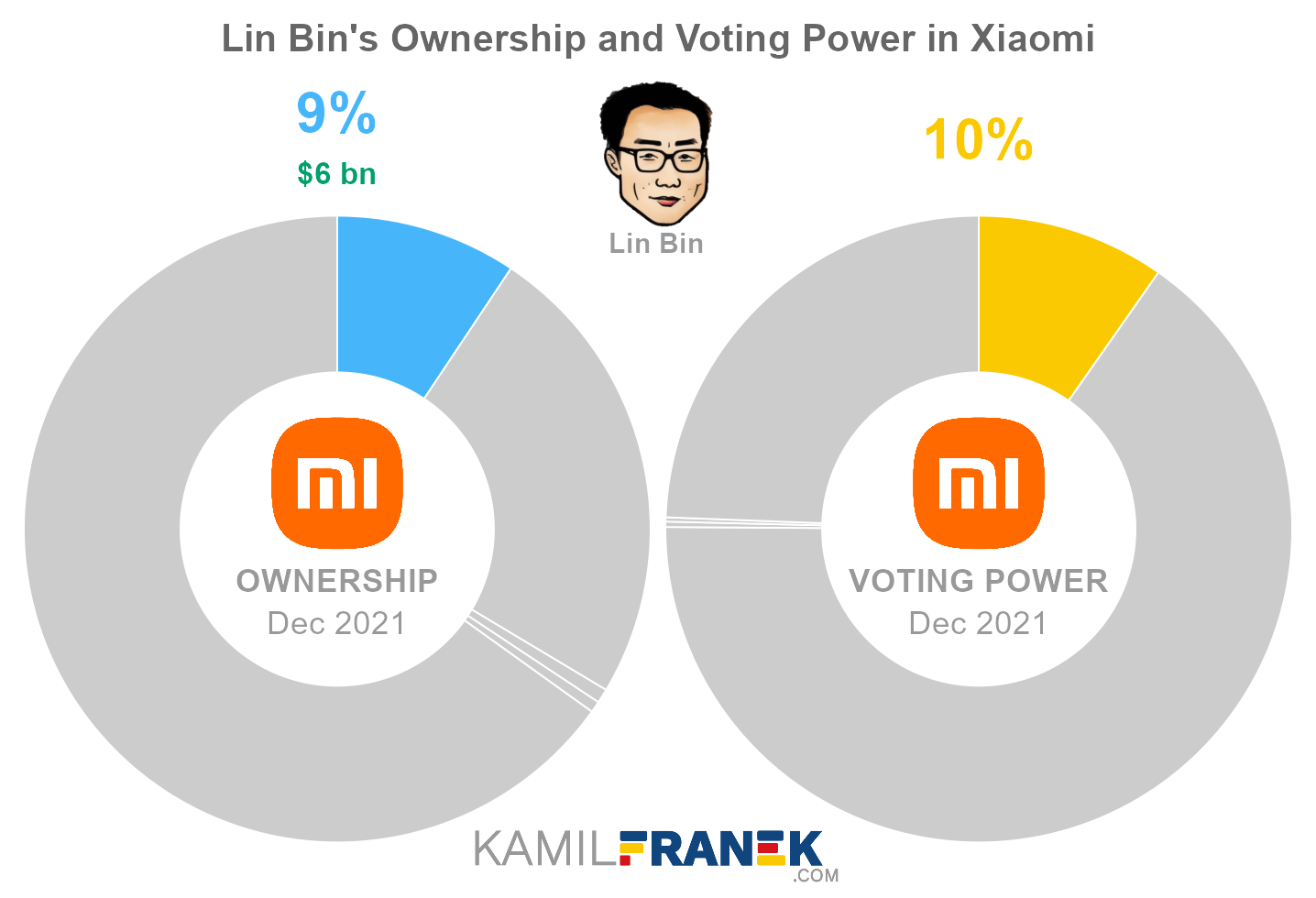
Lin Bin owns 2,340 million Xiaomi shares, representing 6,484 million shareholder votes. The market value of Lin Bin’s stake in Xiaomi was $6 billion as of December 2021.
Lin Bin is a co-founder and vice-chairman of Xiaomi. Before Xiaomi, he worked in different positions for Microsoft and Google. In 2010, he co-founded Xiaomi with Lei Jun.
#3 Liu Qin
Liu Qin holds 1% of Xiaomi’s shares, making him its third-largest shareholder. However, its voting power is only 0% since some of the other shareholders hold super-voting shares that dilute Liu Qin’s control of Xiaomi.
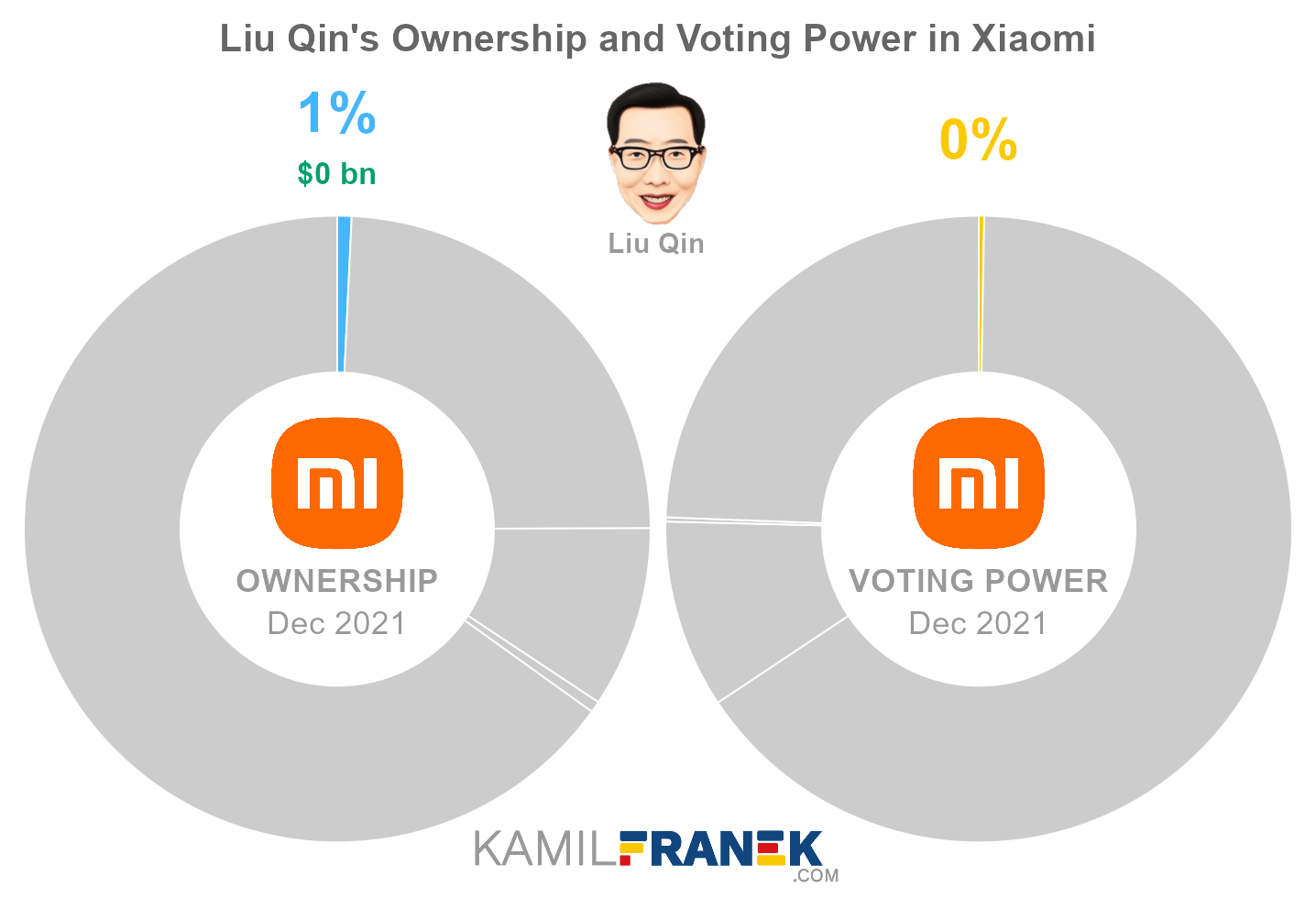
Liu Qin owns 184 million Xiaomi shares, representing 184 million shareholder votes. The market value of Liu Qin’s stake in Xiaomi was $0 billion as of December 2021.
Liu Qin (former name: Liu Ya) has been a non-executive director of Xiaomi since 2010. He is also a co-founder and former managing director of 5Y Capital, one of the earliest investors in Xiaomi.
#4 Liu De
Liu De holds 1% of Xiaomi’s shares. However, its voting power is only 0% since some of the other shareholders hold super-voting shares that dilute Liu De’s control of Xiaomi.
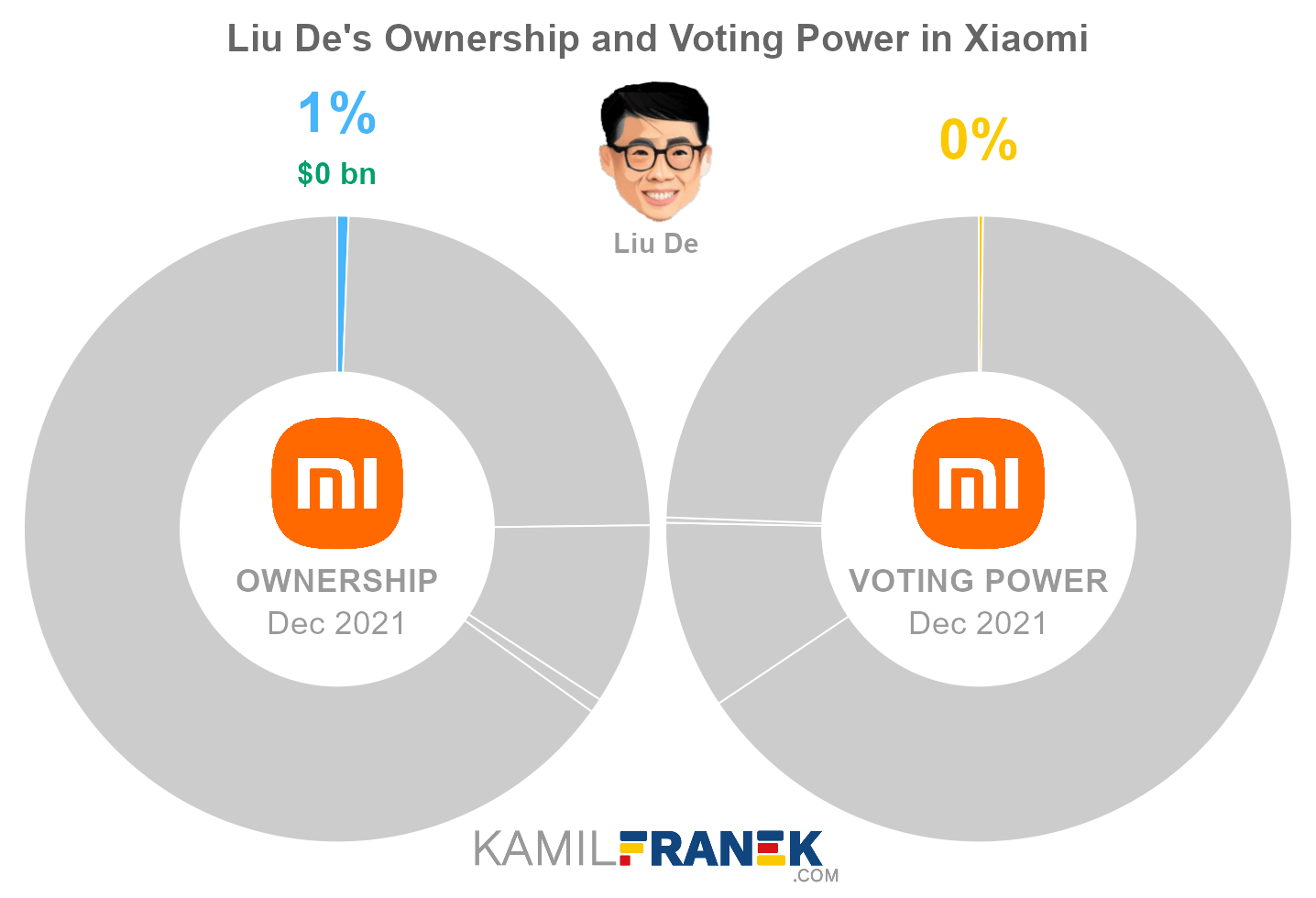
Liu De owns 146 million Xiaomi shares, representing 146 million shareholder votes. The market value of Liu De’s stake in Xiaomi was $0 billion as of December 2021.
Liu De is the senior vice president, director a co-founder of Xiaomi. Liu De established the Industrial Design Department at the University of Science and Technology Beijing in 2001 and served there as a dean.
❔ Is Xiaomi a Chinese Company?
Xiaomi is a Chinese-based company with headquarters in Beijing and an international headquarters in Singapour. However, Xiaomi is legally incorporated in the Cayman Islands and listed on Hong Kong Exchange.
As a company based in China, Xiaomi is obligated to share data with the Chinese government, although the company claims that this is not applied to international customers.
Xiaomi’s Chinese origin put the company under a lot of scrutiny thanks to worries in the US, Europe, and India about possible censorship and user data being sent to China.
The same concern, however, also created an opportunity for Xiaomi to grow faster when the U.S. sanctions heavily damaged the international business of their competitor Huawei.
- The US Defense Department put Xiaomi on the list of companies with links to China’s military, which would effectively block US companies and citizens’ investments in the company. This decision was eventually blocked by the court as “deeply flawed.” One of the main reasons why the company was put on the list was an award given to its founder, Lei Jun, in 2019 for his service to the Chinese state.
- Thanks to dodging the ban, Xiaomi thrived at the expense of Huawei, which did not manage to avoid U.S. sanctions. Xiaomi thus became the world’s second-largest smartphone manufacturer after Samsung.
It is important to realize that Xiaomi’s phone operating system MIUI is based on Android, and outside China, the business has the same dependence on Google’s Google Play Services as Huawei did.
- This means that any move by the US government to block Google from providing access to Google Play services could be devastating for Xiaomi, as it was for Huawei.
- The situation is different for smartphone sales within China because its operating system does not use Google Play Services for phones sold within China and relies on an open-source version of Android.
❔ Are Huawei and Xiaomi the Same Company?
Although Huawei and Xiaomi are both large China-based smartphone manufacturers, they are independent companies. Xiaomi is now the second largest smartphone manufacturer after Samsung, as Huawei’s market share suffers under U.S. sanctions.
Xiaomi has so far avoided sanctions against it by the U.S. government. Although it was for a short time listed by the US Defense Department on its list of companies with links to China’s military, which would mean a ban on investment into the company by US citizens, Xioam successfully challenged this decision in court.
📚 Recommended Articles & Other Resources
Who Owns Apple: The Largest Shareholders Overview
Visual overview of who owns Apple and who controls it. With a list of the largest shareholders and how much is each of their stake worth.
Who Really Owns Google (Alphabet) and Who Controls It
Overview of who owns Alphabet (Google) and who controls it. With a list of the largest shareholders and how much is each of their stake worth.
Who Owns Paypal: The Largest Shareholders Overview
Overview of who owns PayPal and who controls it. With a list of the largest shareholders and how much is each of their stake worth.
Who Owns Tesla: The Largest Shareholders Overview
Overview of who owns Tesla and who controls it. With a list of the largest shareholders and how much is each of their stake worth.
Who Owns Nike: The Largest Shareholders Overview
Overview of who owns Nike and who controls it. With a list of the largest shareholders and how much is each of their stake worth.
Other Resources
Disclaimer: Although I use third-party trademarks and logos in this article and its visuals, kamilfranek.com is an independent site, and there is no relationship, sponsorship, or endorsement between this site and the owners of those trademarks.

